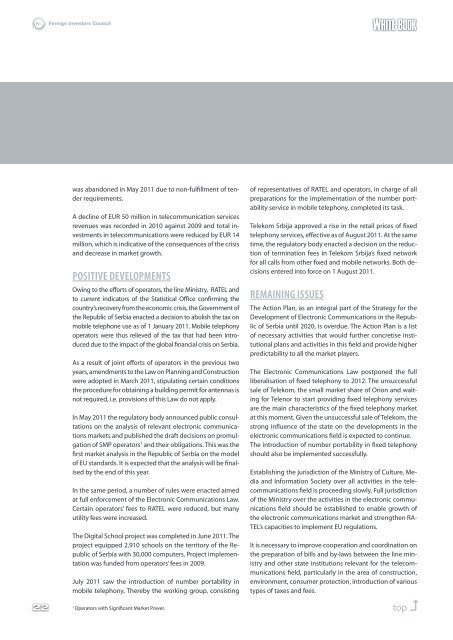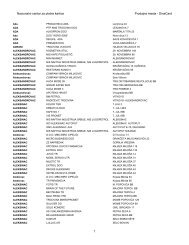Fic rEcommEndationS - Eurobank EFG
Fic rEcommEndationS - Eurobank EFG
Fic rEcommEndationS - Eurobank EFG
You also want an ePaper? Increase the reach of your titles
YUMPU automatically turns print PDFs into web optimized ePapers that Google loves.
was abandoned in May 2011 due to non-fulfillment of tender<br />
requirements.<br />
A decline of EUR 50 million in telecommunication services<br />
revenues was recorded in 2010 against 2009 and total investments<br />
in telecommunications were reduced by EUR 14<br />
million, which is indicative of the consequences of the crisis<br />
and decrease in market growth.<br />
PoSitiVE dEVELoPmEntS<br />
Owing to the efforts of operators, the line Ministry, RATEL and<br />
to current indicators of the Statistical Office confirming the<br />
country’s recovery from the economic crisis, the Government of<br />
the Republic of Serbia enacted a decision to abolish the tax on<br />
mobile telephone use as of 1 January 2011. Mobile telephony<br />
operators were thus relieved of the tax that had been introduced<br />
due to the impact of the global financial crisis on Serbia.<br />
As a result of joint efforts of operators in the previous two<br />
years, amendments to the Law on Planning and Construction<br />
were adopted in March 2011, stipulating certain conditions<br />
the procedure for obtaining a building permit for antennas is<br />
not required, i.e. provisions of this Law do not apply.<br />
In May 2011 the regulatory body announced public consultations<br />
on the analysis of relevant electronic communications<br />
markets and published the draft decisions on promulgation<br />
of SMP operators 1 and their obligations. This was the<br />
first market analysis in the Republic of Serbia on the model<br />
of EU standards. It is expected that the analysis will be finalised<br />
by the end of this year.<br />
In the same period, a number of rules were enacted aimed<br />
at full enforcement of the Electronic Communications Law.<br />
Certain operators’ fees to RATEL were reduced, but many<br />
utility fees were increased.<br />
The Digital School project was completed in June 2011. The<br />
project equipped 2,910 schools on the territory of the Republic<br />
of Serbia with 30,000 computers. Project implementation<br />
was funded from operators’ fees in 2009.<br />
July 2011 saw the introduction of number portability in<br />
mobile telephony. Thereby the working group, consisting<br />
of representatives of RATEL and operators, in charge of all<br />
preparations for the implementation of the number portability<br />
service in mobile telephony, completed its task.<br />
Telekom Srbija approved a rise in the retail prices of fixed<br />
telephony services, effective as of August 2011. At the same<br />
time, the regulatory body enacted a decision on the reduction<br />
of termination fees in Telekom Srbija’s fixed network<br />
for all calls from other fixed and mobile networks. Both decisions<br />
entered into force on 1 August 2011.<br />
rEmaininG iSSUES<br />
The Action Plan, as an integral part of the Strategy for the<br />
Development of Electronic Communications in the Republic<br />
of Serbia until 2020, is overdue. The Action Plan is a list<br />
of necessary activities that would further concretise institutional<br />
plans and activities in this field and provide higher<br />
predictability to all the market players.<br />
The Electronic Communications Law postponed the full<br />
liberalisation of fixed telephony to 2012. The unsuccessful<br />
sale of Telekom, the small market share of Orion and waiting<br />
for Telenor to start providing fixed telephony services<br />
are the main characteristics of the fixed telephony market<br />
at this moment. Given the unsuccessful sale of Telekom, the<br />
strong influence of the state on the developments in the<br />
electronic communications field is expected to continue.<br />
The introduction of number portability in fixed telephony<br />
should also be implemented successfully.<br />
Establishing the jurisdiction of the Ministry of Culture, Media<br />
and Information Society over all activities in the telecommunications<br />
field is proceeding slowly. Full jurisdiction<br />
of the Ministry over the activities in the electronic communications<br />
field should be established to enable growth of<br />
the electronic communications market and strengthen RA-<br />
TEL’s capacities to implement EU regulations.<br />
It is necessary to improve cooperation and coordination on<br />
the preparation of bills and by-laws between the line ministry<br />
and other state institutions relevant for the telecommunications<br />
field, particularly in the area of construction,<br />
environment, consumer protection, introduction of various<br />
types of taxes and fees.<br />
1 22 Operators with Significant Market Power.<br />
top �




